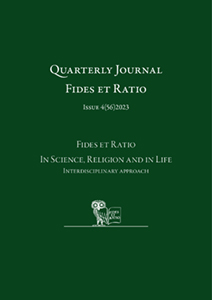Abstract
Before Benedict XVI became Pope, he was often referred to as an armoured cardinal. As prefect of the Congregation for the Doctrine of the Faith, he served the Church as a theologian protecting dogma and orthodoxy in the implementation of the Decalogue and the truths of the faith. In the great wealth of texts and speeches he left behind, his personal, but also the foundation of his own theology, is present an answer to the question of what it means to be a believer.In his classic work, Introduction to Christianity, Cardinal Ratzinger concentrated on an analysis of the words of the Creed from the first I believe to the last amen. The most important, the most obvious, but at the same time the most difficult aspect of the Christian faith is that it has a personal character. Its essential formulation is: I believe in you. Understood in this way, faith is an encounter with the person of Jesus Christ and, through him, with the personal God, in the Trinity one.
References
Benedykt XVI, (2005). Deus caritas est. Watykan.
Benedykt XVI, (2006). Faith, Reason and the University. Memories and Reflections, 12.09.2006. (From:) https://www.vatican.va/content/benedict-xvi/en/speeches/2006/september/documents/hf_ben-xvi_spe_20060912_university-regensburg.html (access: 04.09.2023).
Benedykt XVI, (2009). Caritas in veritate. Watykan.
Benedykt XVI, (2011). List Apostolski w formie „Motu Proprio” Porta Fidei: 11.10.2011. (From:) https://www.vatican.va/content/benedict-xvi/pl/motu_proprio/documents/hf_ben-xvi_motu-proprio_20111011_porta-fidei.html. (access: 04.09.2023).
Benedykt XVI, (2022). Moja wiara. Kraków: Znak.
Burgos, J.M. (2010). Personalizm. Warszawa: Centrum Myśli Jana Pawła II.
Gacka, B. (2014). Personalizm chrześcijański św. Jana Pawła II. Studia Theologica Varsaviensia, 1, 29-30.
Ratzinger, J. (1985). The Ratzinger Report. San Francisco: Ignatius Press.
Ratzinger, J. (1999). Nowa pieśń dla Pana. Kraków: Znak.
Ratzinger, J. (2000). Śmierć i życie wieczne. Warszawa: PAX.
Ratzinger, J. (2005). Moje życie. Częstochowa: Edycja Świętego Pawła.
Ratzinger, J. (2006). Christianity and the Crisis of Cultures. San Francisco: Ignatius Press.
Ratzinger, J. (2007). Jesus of Nazareth, From the Baptism in the Jordon to the Transfiguration. New York: Doubleday.
Ratzinger, J. (2010). Prawda, wartości, władza. Kraków: Znak.
Ratzinger, J. (2018). Wprowadzenie w chrześcijaństwo. Kraków: Znak.
Salij, J. (2021). Dzieła wybrane, t. II, Święty Tomasz z Akwinu. Warszawa: Teologia Polityczna.
Sobór Watykański II, (1964). Konstytucja dogmatyczna o Kościele „Lumen Gentium”. (From:) https://www.vatican.va/archive/hist_councils/ii_vatican_council/documents/vat-ii_const_19641121_lumen-gentium_lt.html, (access: 04.09.2023).
Sobór Watykański II, (1965). Konstytucja duszpasterska o Kościele w świecie współczesnym „Gaudium et Spes”. (From:) https://www.vatican.va/archive/hist_councils/ii_vatican_council/documents/vat-ii_const_19651207_gaudium-et-spes_lt.html (access: 04.09.2023).
Thomas Aquinas, (1975). Suma teologiczna. O Bogu, t. 1 (I, q. 1-12), tłum. P. Bełch. Londyn: Katolicki Ośrodek Wydawniczy „Veritas”.
Teinert, Z. ( 2006). Habermas i Ratzinger: Wiara i wiedza w dobie sekularyzacji. Poznańskie Studia Teologiczne, 20, 151-168.
Wojtyła, K. (1961). Personalizm tomistyczny. Znak, 13(5), 664-675.
Wojtyła, K. (1979). The Acting Person. Dordreht, Boston, London: D. Reidel Publishing Company.

